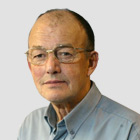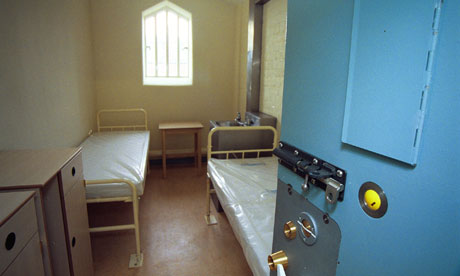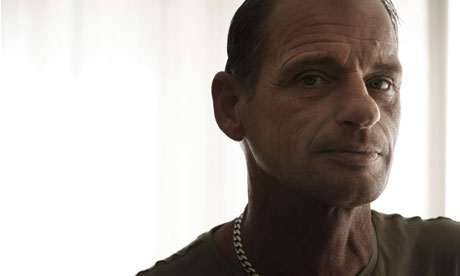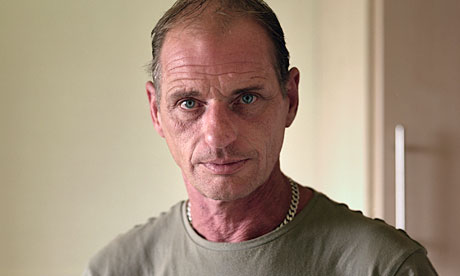"My name's Kevin Raymond Young and I'm 52 years old." There's
something desperate about the way Young says it, as if he's clinging to
the wreckage of his identity. Young was 17 when he was sent to Medomsley
detention centre in County Durham. He'd already had a tough life –
taken into care at two, sexually and physically abused by those who were
meant to look after him – but this was something different. As soon
as he starts to tell his story, he's in tears.
His experience of
Medomsley in 1977 has shaped, or disfigured, his life ever since. He was
convicted of receiving stolen property – a watch his brother had given
him; the first he had owned. The police asked if he knew where it had
come from. No, he said. Could it possibly have been stolen, they asked.
He thought about it – well, yes, possibly. He was sentenced to three
months' detention.
The morning after he arrived at Medomsley,
Young was lining up for breakfast when he was picked out of the queue by
Neville Husband, the officer who ran the kitchen. Young later
discovered that Husband had asked for his file – he wanted to know
everything about him; most importantly, whether he had family who were
likely to visit him. Young was one of a handful of new inmates sent to
work in the kitchen with Husband.
"There are two things that are
important to successfully sexually abuse somebody," Young says. "By
successful, I mean without being prosecuted. One, anonymity or silence –
if you can't carry out your act without people knowing, you're not
going to be at it very long. The second thing you need is a victim who's
'reliable'; a reliable victim is someone who's already been abused to
the point where, if they do speak out, who on Earth is going to believe
them? And who on Earth is going to believe Kevin Young, the pauper's
son, who has been in and out of care, who's a knife-wielding thug, a
bully?" That is how a number of care home reports described Young, but
he insists he was a quiet, over-obedient boy. "The truth is, nobody
would have believed me."
Abuse might be too mild a word for what
Husband did to Young over the next two months. "I was raped repeatedly,
tied up and ligatured [around the neck]. It was the worst of the worst."
That day after Young arrived, Husband took him to a storeroom above the
kitchens that he had converted into a lounge. He locked the door, took
out the key and stuffed the keyhole with tissues. "I thought I was going
to be killed," Young says. "I was told by Husband that you could easily
be found hanged at Medomsley, and that that year, six boys had already
hanged themselves."
Young insists there wasn't just the one man
abusing him. "He was so sure of himself that he was able to take me out
of the prison against my will and to his private house just outside the
prison gates. He was married with one child. In his house I was
blindfolded, ligatured and made to lie on the stairs. Then three or four
others raped me as well. I could see them from the bottom of the
blindfold. A rope was put round my neck and turned till I passed out.
Husband was an expert at it. He was a big, stocky, powerful man."
Perhaps
the most horrifying aspect of the Neville Husband story is that the
detention centre, the prison service and the police all knew of his
interest in boys. In 1969, eight years before Young was jailed, Husband
was arrested at Portland borstal in Dorset and charged with importing
pornography. The material seized included sado-masochistic images
involving teenage boys.
Astonishingly, the charges were dropped.
Husband admitted showing the material to boys in his care, but argued
that he was interested in child pornography only because he was
conducting research into homosexuality. Details of that arrest were
written on top of his employment record and went with him throughout his
career. He moved to Medomsley, the smallest detention centre in the
country, where he abused boys aged between 16 and 19 until he was moved
16 years later. From accounts given by victims and former staff, he may
have abused boys every day of his tenure there.
Dr Elie Godsi, a
former senior psychologist for the Home Office, gave evidence in the
civil action brought by Young and other victims. "This is one of the
worst cases of sexual abuse I have come across in 17 years of working
for the Home Office, and with some of the most prolific sex offenders in
the country," he said.
Today, more than 40 years since Husband
started abusing teenage boys, more and more damaged men are coming
forward to reveal how he ruined their lives. Some have been paid
compensation, but they say that's not enough. They want to know how he
was allowed to get away with it for so many years, and why the police
and colleagues in the prison system failed to notice his abuse or act on
their suspicions.
Kevin Young came out of Medomsley on 17 June
1977, a day before his 18th birthday, and went straight to Consett
police station, the nearest to the centre. "I explained to the officer
that I'd just been released from Medomsley, where I'd been subjected to
a constant series of assaults by one of the officers and others
I couldn't identify. I showed him the marks on my neck where I'd been
ligatured the night before. I was told it was a criminal offence to make
such allegations against a prison officer because I was on licence.
They were basically threatening to take me back to Medomsley,
so I scattered pretty quick."
After that, Young did his best to
block Medomsley from his mind. He tried not to think about it, never
told anyone about it, and got on with his life. After a short stint in
the punk rock group
the Angelic Upstarts,
he became a successful businessman, owning 22 cafes and a number of
furniture stores. By 1996, he says, he was worth close on £2m and was
running a security firm with his girlfriend.
One night they were
chasing a couple of store robbers in the centre of York, where Young now
lived, when he skidded into a man of the church near York Minster. "He
was there with his full carry-on, his big hat and all his gear. When
I banged him in the chest, it knocked the wind out of him, and as I was
falling backwards, his spit was coming down on me. I looked up and there
he was. And in that split second I was back 20 years ago, with him on
top of me."
Since leaving the prison service, Husband had trained
and qualified as a minister. The shock of seeing him after all this time
sent Young into meltdown. He collapsed. "There were people lifting me
up, saying, 'Are you all right?' and my girlfriend was shouting, 'What
are you doing? We need to be going. There's a chase on.' I was just
frozen. I didn't know where I was."
How could he be so sure it was
Husband after all that time? "Course I knew it was him. I could taste
him." What does he mean? "He spat all over me and humiliated me. He
opened my mouth and spat into it time and time again." Young breaks down
again. "It was horrendous. Off he trotted and I'm left in the middle of
York with my girlfriend shouting, 'What are you doing?' I walked off
and wandered about for four hours while my radio was going, 'Where are
you going? Where are you?" He's shaking and weeping, and stops for a
cigarette.
Young cracked up. He started to drink and became
addicted to drugs, spending £1,250 a week on cocaine. He sold the
business for a third of its value to subsidise his habit, lost his
girlfriend, lost his house, lost everything. Once the memory he'd
blocked for 20 years returned, he could think of nothing else. He moved
into a barn in the middle of nowhere, spoke to no one and gave up on
life.
Two years after he had come across Husband again, the police
tracked down Young to a bedsit he was then living in and pushed a note
through the door asking if he'd give evidence about abuse that had
happened at St Camillus, a home where he had been abused before
Medomsley. For months he ignored them, but eventually he agreed to talk.
He told the police that what had happened at St Camillus was bad, but
there was worse. "I said let me tell you a true horror story, and
I rattled off what had happened to me at Medomsley. About three weeks
later, a chief inspector came to my door and said, 'We've been after
Neville Husband for years.'" Husband had recently been the subject of
complaints about abuse of boys and girls in his congregation while
working as a minster at two churches in Gateshead, but the parents
involved had not wanted to pursue the matter. When his office was later
raided, sex aids were found in his drawers and child pornography on his
computer.
Young was taken to a safe house in York, where he was
shown a film on an 8mm projector. "The film showed a young boy about
16-17 with a rubber thing across his head, being choked. And they asked
me, who do you think it is there?" Again, his voice breaks and he takes a
few seconds to compose himself. "And I said, 'I don't need to tell you
who I think it is.' It was me. So I had to sit down and watch 40 minutes
of me being… He'd made films of many of his victims. Ccccrrrrrrrr…"
Young imitates the sound of the projector. "When I was being assaulted, I
could hear that. Remember the old wind-ups? Half my pain comes from
listening to crrrrrrrrrrr."
Young's willingness to give evidence
against Husband led to his arrest. It should have been a cathartic
moment, a vindication, but it wasn't. If the police had known about
Husband for years, why had nothing been done? After all, they had
evidence of his obsession with child pornography dating back decades,
and Young had reported the abuse 22 years earlier. Young is convinced
the police had held on to the film for 14 years without doing anything
about it. "I believe the films and photographs were taken from the
property of Neville Husband in 1985," he says.
That's the year the
police raided Medomsley and arrested Husband's friend Leslie Johnson,
a storeman at the detention centre. Johnson was later convicted of
abusing a young inmate, Mark Park, who, he said, had been "given to him"
by Husband. Park told police that Husband had also abused him, but they
took no action. Years later, at Husband's trial, Park named several
officers at Medomsley who, he said, had made comments to him about
Husband abusing him and other boys. A former officer at Medomsley told
the court, "Staff knew something was going on between Husband and the
boys." Another former officer said Husband used to keep a boy behind in
the kitchen at night and "we always used to feel sorry for that boy".
Park himself was later convicted of a rape unrelated to Medomsley. He
is now serving a life sentence.
Husband left Medomsley shortly
after Johnson's arrest and moved to Frankland, a high-security adult
jail near Durham. When staff at Medomsley searched his drawers and
lockers, they found pornographic material and sex aids. Husband was to
continue working in the prison service for another five years.
He
requested a move to Deerbolt, a young offenders institution, where it is
alleged he abused inmates again. He eventually moved back to Frankland,
from where he was medically discharged in 1990. On his retirement,
managers at Frankland put him forward for the Imperial Service Medal,
writing, "Husband has served with diligence and fidelity and should be
recommended for the award."
In 2003, Husband was finally convicted
of sexually abusing five young male inmates between 1974 and 1984,
after pleading not guilty. Sentencing him to eight years in prison,
Judge Cockroft said, "Your victims were young detainees who you chose to
work for you in the kitchen so that you could abuse them. There you
caused them to submit to your unwelcome attentions. This was a gross
breach of trust. You, and others like you, caused their damaged
personalities. Until now, they thought no one would believe them."
In
2005, Husband's sentence was increased to 10 years after new victims
came forward and he admitted to attacks on four more boys. In 2007, the
Crown Prosecution Service announced it would not be charging Husband
over an allegation that he went on to abuse a boy in Deerbolt because it
would "not be in the public interest".
There has never been a
public inquiry into Medomsley, despite the scale of abuse, nor did the
prison service hold an inquiry into how Husband's abuse continued for so
long. James Millar Reid was governor at Medomsley from 1976 to 1978,
which covers the time when Kevin Young was abused. At the beginning of
September 2000, he was visited by detectives from Durham, who were
investigating Husband. A few days after the visit, he went missing and
his body was found in a wood in Stelling Minnis, near Canterbury. The
inquest was held in February 2001 and an open verdict was returned. The
cause of death recorded was "Unascertainable" as the body was badly
decomposed.
Some senior figures who worked at Medomsley are
reluctant to talk about their time at the detention centre. Tim Newell, a
well-known liberal thinker within the prison establishment, was the
governor from 1979 to 1981, when Husband was regularly abusing boys in
his charge. According to David McClure, a former officer at Medomsley,
who gave evidence at Husband's trial, Newell "thought very highly of
Husband".
McClure said search teams were banned from the kitchen on the
orders of management, but that there were always strong rumours that
Husband was sexually abusing boys who were working in the kitchen.
"There was general knowledge about this – among staff and boys in the
centre," he said. But Newell and other governors wrote letters
supporting Husband's many applications to remain at Medomsley when the
prison service suggested he be promoted and posted elsewhere. Newell was
repeatedly asked to comment on Husband and Medomsley for this piece,
but he failed to answer emails and phone calls over a period of months.
Martin
Narey was director general of the prison service when Husband was
convicted in 2003. He had been the assistant governor at Deerbolt when
Husband was moved there after the arrest of Johnson, and the assistant
governor of Frankland. He went on to become CEO of Barnardo's, the
charity for vulnerable children.
Why did Narey never call for a
public inquiry? "For the simple reason that, at the time, I knew nothing
about it," he says. "That may sound very odd, with what we know now
about Neville Husband. But the first conviction, which came just as I
was leaving the director general post, was not brought to my attention.
I suspect it was because, at that time, the magnitude of Husband's
offending was not known."
Would he support a public inquiry now?
"I have no objection to some sort of inquiry – whether a public inquiry
would be justified, I don't know. It is troubling that Husband was able,
apparently, to hide his offending over such a long period. However, and
speaking after having had long experience of child abuse issues at
Barnardo's, I am now very aware of the ability and success of such
offenders in conditioning those around them."
Narey admits that,
when he was running it, the prison service dealt inadequately with
sexual abuse in prisons. "As director general, I was intolerant of
physical abuse and racism, and sacked a lot of staff… But at that time
there was very little awareness of male-on-male sexual abuse, either in
prisons or in wider society." Neither Narey nor Newell – still two of
the most respected figures in prison circles – has ever publicly
apologised for the failure to spot Husband's abuse.
In 2009,
Husband was released from prison after serving just over half his
sentence. A year later, he died of natural causes. Yet the fallout from
his decades of abuse continues.
Steve, whose name has been
changed, admits he's paranoid. He has surrounded his home with seven
closed-circuit television cameras and spends nearly all his time in his
upstairs office, where he works and monitors the CCTV screens. "Work" is
obtaining justice for the victims of Medomsley, for whom he is the
liaison man. It has been the "cause" of his life for the past 15 years
and will continue to be so until he gets somebody in authority to say
sorry. "I could maybe then close it all down and move on."
Steve
is wearing sunglasses and when he takes them off, his eyes look dead.
His story is familiar – like Young, he went through a long line of
children's homes, where he experienced differing degrees of abuse,
before ending up at Medomsley. Again like Young, he stresses that abuse
was nothing compared with what was to happen. Steve was sent to
Medomsley for "aiding and abetting in stealing a car". His cousin Kevin
had a stolen car, picked him up in it, and that was that. He was 16.
According
to Steve, Husband stood out from the other officers. "When we first got
there, we'd stand in line and he'd look at all the new recruits,
laughing and joking with them, trying to be your friend and have some
understanding about why you're here and that. He'd try to ingratiate
himself. He picked people who had no one to visit them. All the victims
were from the care system."
Husband had a shower built upstairs in
the converted storeroom because, he claimed, the boys did not have time
to wash before coming to work. That's where Steve was first abused. "He
pushed us backwards into the shower, then started grabbing the things
he shouldn't. I didn't know what to make of it or do, where to go. I was
in prison, I couldn't run away."
How big was Steve then? "I was
a scrawny little thing, about nine and a half stone. You tried to say no
and it didn't make a blind bit of difference."
Does he suspect
Husband abused all the kitchen boys? "I know he did. Everybody knew he
was doing it. Nobody would say it was happening to them, yet it was the
talk of the place. You'd get comments off the officers: 'What you been
up to with Husband?' 'You're one of his boys?'"
The abuse wasn't
just sexual, Steve says. "I saw him crushing one guy between two gates.
He just kept doing it and laughing. Another time he put my hand in a hot
pidi – a metal pie dish – and was pushing my hand down as he was
fondling me." Did other officers see any of this? "He had a monopoly in
that area. You weren't allowed to go in there. Officers had to ask him
to go in."
When did Steve leave Medomsley? "28 August 1979," he
says instantly. He came out traumatised: untrusting, angry, a loner. He
started to drink heavily. Unlike Young, he didn't report the abuse to
the police on his release. Then, in 1994, he was watching television and
a report came on about abuse in a care home in Sunderland. Steve says
he flipped. He was sitting with his wife, with whom he had never
discussed the abuse. "I saw it, and just, pppffff, blew up. First the
coffee table went over, and I was just destroying the house. I even hurt
my wife by accident, throwing a guitar across the room. I didn't know
what had happened."
Once he'd calmed down, he told his wife
everything and they went to the police. Why had he never been before?
"Well, if it's the system doing it, what's the point in going to tell
the system about it? There was no possible redress. When I did
eventually go to the police station, I got the answer I expected." Which
was? "'We suggest you go home, put it behind you, because you can
imagine the effect it will have on your wife and children should this
get out on the estate where you live.'" Steve ignored the advice and
took it to a higher police authority.
How did he feel after
Husband was convicted? "I cried like a baby – with relief and
satisfaction. Christ, at long last… Yes, we had done wrong, yes, we
possibly deserved to go to a place like that, but we didn't deserve what
happened there."
Has he found peace since Husband went to jail?
"No, I'll never be over it. You only have one life and once it's
irreparably damaged, that's it."
After Husband was convicted came
the fight for compensation for his victims. The Home Office fought every
allegation. At one point, Steve says, a doctor was brought forward in
court to claim that Kevin Young was genetically predisposed to being
abused. Young received £94,000 to compensate for his suffering and lost
fortune. He reckons he spent £40,000 fighting his case. Steve received
compensation in 2009 – £40,000. "It's not about compensation, it's about
understanding. I gave it away," he says. Until he saw the report on
television, he had worked in a number of jobs, but he has not been
employed since. Now he is on jobseeker's allowance and a small sickness
payment.
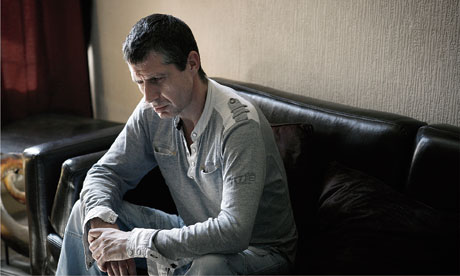
Richard Hall, 48, lives in a first-floor flat in Heaton, a pleasant
suburb of Newcastle. A quiet, softly spoken man, his eyes dart nervously
around the room as we speak. Hall entered the care system aged just
three weeks. The son of a prostitute mother and a pimp father, he was
briefly placed with foster parents in 1963 before being moved from one
care home to another.
By the time he was 12, Hall had been in 15
homes, and had suffered physical and sexual abuse in several of them. He
was sent to Medomsley just before Christmas 1979. Like Steve, he had
pleaded guilty to being carried in a stolen car and received three
months' detention. A week later, while standing in the dinner queue,
Hall was tapped on the shoulder by Husband and told, "You are working
for me."
The abuse began almost immediately. On one occasion,
Husband was about to rape him when he was interrupted by the arrival of
another young inmate, Hall's friend Martin Wasnidge. Wasnidge later
mocked Hall about Husband. Shame meant the two boys didn't talk to one
another about what was going on. In 2003, during Husband's trial,
Wasnidge hanged himself in prison: he had been questioned by police as
a possible victim, but had denied being abused by Husband. Hall believes
the denial was because Wasnidge did not want his fellow prisoners to
know what had happened at Medomsley. Hall learned of Wasnidge's death as
he stepped out of the witness box. The news left him guilt-ridden
because he was the one who had told police Wasnidge had been abused (he
had seen Husband groping him). "If I hadn't done that, he'd still be
alive," Hall says.
Hall had one visitor at Medomsley – his sister,
who was also brought up in care. Hall told her about the abuse Husband
was inflicting on him. A victim of abuse herself, his sister advised him
to say nothing. "Nobody will believe you, Richard," she said, "and you
will be in bigger trouble."
Hall took refuge in drink. After he
came out of Medomsley, he would down 24 cans of beer in an average day.
Now, he has cut down to a dozen cans, maybe four days a week. On the
other three days, he stays in bed with the curtains drawn. He says he
feels "empty, a hollow man".
Like Steve, Hall seldom leaves his
flat, which he decorated with some of the £40,000 compensation he
received from the Home Office in November 2009. It was part of a total
of £512,000 the Ministry of Justice paid out to 12 men. Hall is bitter
about the settlement, which took six years to negotiate.
When the
Medomsley victims first sought redress, the Home Office used the statute
of limitations to avoid payment. It defended that decision in a costly
legal fight that went all the way to the House of Lords. Even when the
law lords ruled in favour of the claimants, the Home Office refused to
back down and declared its intention of fighting the claim in court.
David Greenwood,
of Jordans Solicitors in West Yorkshire, has dealt with all the
Medomsley victims' cases, representing 26 abused boys so far. He says
that, given Husband's modus operandi, hundreds of boys may have been
abused by him. Greenwood estimates the costs to the Home Office of
fighting the cases at around £100,000. At the end of the hearing of
Young's case, in 2005, his lawyers asked the Home Office if it intended
to carry out a review or investigation of Medomsley. They were told
there were no plans to do so.
Greenwood was surprised by this. "It is
odd when a senior prison officer has sexually assaulted boys, including
taking them to his house to do so, and other staff seem to have turned a
blind eye to it and not reported finds of pornographic material, that
no investigation was carried out."
A spokesman for the Ministry of
Justice told the Guardian, "In the late 1970s, several detainees held
at Medomsley detention centre were physically and sexually abused by
Neville Husband… At no stage has the Ministry of Justice attempted to
defend the actions of Mr Husband. The prison service has come a long way
since the 1980s, and significant efforts have been made to eliminate,
so far as is possible, the mistreatment of prisoners."
The victims are appalled that they did not receive an apology. Steve complained to his MP,
Stephen Byers, who wrote to the then justice minister
Jack Straw.
Straw replied: "The terms of the agreement did not include an apology."
Hall says the settlement, and the nature of its conclusion, made him
feel "abused again".
None of the victims has been offered
counselling or psychiatric help; indeed, the terms of their settlement
stated that if such help was required, the victims should pay for it out
of their award.
Today, Kevin Young lives in a shed in a friend's
garden. He's no longer addicted to drink or drugs, but he knows he's far
from healthy. He says he's typical of Husband's victims – broken. He is
considering suing the police. For decades, they denied he'd complained
the day he was released, but he recently received a letter acknowledging
that they had in fact received a number of complaints about Husband's
abuse, "particularly during the 1970s and 1980s".
Richard Hall
says he thinks about killing himself every day. He made one serious
attempt in 2003, when he swallowed two packets of Prozac washed down
with alcohol. One of the things he finds most devastating is that there
were staff at Medomsley who did not act on their suspicions of Husband.
"Some of them are still employed by the state, others are drawing their
pensions," Hall says. "Do they not feel any shame?"
Martin Narey,
former director-general of the prison service, doesn't know why or how
those officers failed to report their concerns, but says he is outraged.
"I feel angry about them. There is hardly a hair's breadth of
culpability between Neville Husband, who abused children, and any of the
staff who, apparently, knew about this and failed to take their
concerns forward. In my view, there is a case for the police considering
whether their failure to protect children amounted to aiding and
abetting."





